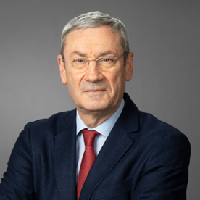Carlos Ardavín received a Ph.D. in Immunology at the Complutense University of Madrid in 1983. He subsequently joined the University of Paris VI as a postdoctoral fellow and, in 1987, he obtained a group leader position as an Associated Professor of Cell Biology and Immunology, at the Faculty of Biology of the Complutense University.
From 1990 to 1991 he worked as an invited senior scientist in the laboratory of Ken Shortman at the Walter and Eliza Hall Institute in Melbourne (Australia) on the origin of dendritic cells, and from 1993 to 1994 in the laboratory of Robson MacDonald and Hans Acha-Orbea at the Ludwig Institute for Cancer Research in Lausanne (Switzerland), on the role of dendritic cells in T cell negative selection and on B cells during infection by the mouse mammary tumor virus.
In 2004 he joined the Department of Immunology and Oncology at the National Center for Biotechnology (CNB/CSIC) as head of the Macrophage and Dendritic Cell Immunobiology Laboratory.
The research work carried out by Dr. Carlos Ardavín over the four last decades focused on the study of innate immunity, and more particularly on the immunobiology of dendritic cells, monocytes, and macrophages, which has led to the characterization of the precursors and differentiation pathways of dendritic cells (Nature, 1993; Nature, 2002; Nature Reviews Immunology; 2003), the demonstration that during in vivo infection monocytes differentiate into dendritic cells, and drive protective T cell responses (Immunity, 2007), and the characterization of the type I-interferon/IL-15 mediated activation of the monocyte-NK cell- neutrophil axis controlling the innate immunity against systemic candidiasis (Immunity, 2013; Immunity, 2017).
Dr. Carlos Ardavín research is currently focused on the response of the innate immune system of the peritoneal cavity against bacterial infections leading to septic shock and against peritoneal metastasis of colorectal tumors. Recent data from Dr. Ardavín laboratory have allowed to explain how peritoneal immune cells, free in a fluidic environment in homeostasis, control bacterial infections through the formation of mesothelium-bound dynamic aggregates, formed by macrophages, B1 cells and neutrophils dependent on extravascular coagulation-triggered fibrin polymerization, that provide a physical scaffold allowing the interaction and function of peritoneal immune cells (Immunity, 2021). These results may be central to antimicrobial immunity in other body cavities, such as the pleural cavity or brain ventricles.




